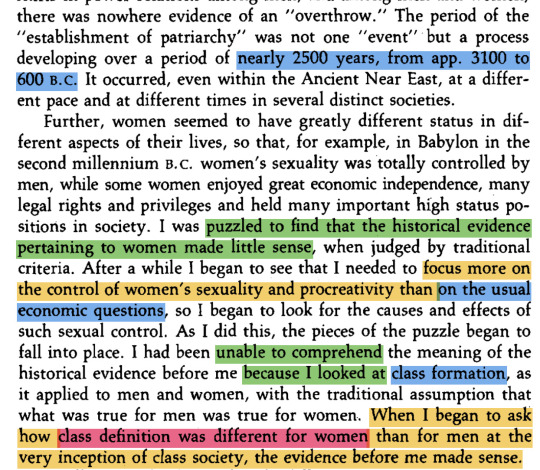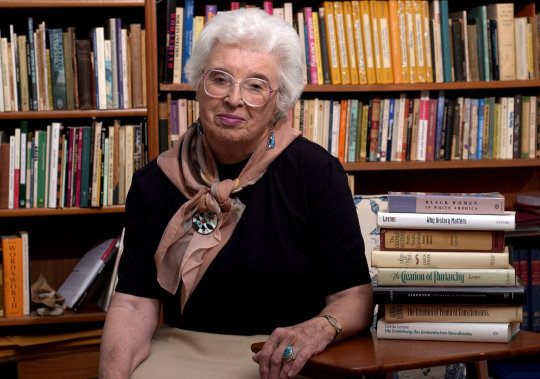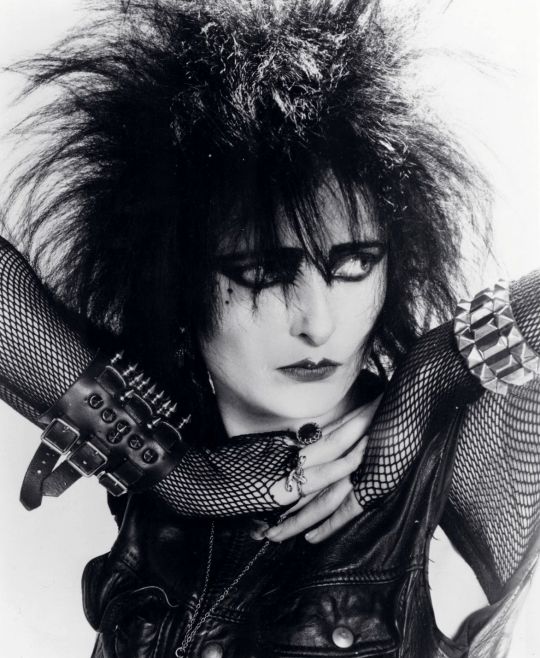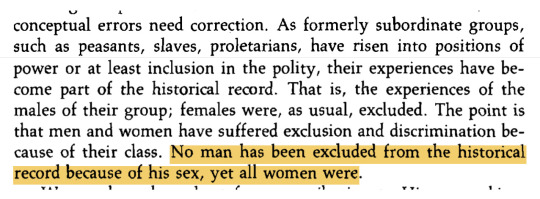#gerda Lerner
Text
“The shift in consciousness we must make occurs in two steps: we must, at least for a time, be woman-centered. We must, as far as possible, leave patriarchal thought behind.
TO BE WOMAN-CENTERED MEANS: asking if women were central to this argument, how would it be defined? It means ignoring all evidence of women's marginality, because, even where women appear to be marginal, this is the result of patriarchal intervention; frequently also it is merely an appearance. The basic assumption should be that it is inconceivable for anything ever to have taken place in the world in which women were not involved, except if they were prevented from participation through coercion and repression.
When using methods and concepts from traditional systems of thought, it means using them from the vantage point of the centrality of women. Women cannot be put into the empty spaces of patriarchal thought and systems—in moving to the center, they transform the system.
TO STEP OUTSIDE OF PATRIARCHAL THOUGHT MEANS: Being skeptical toward every known system of thought; being critical of all assumptions, ordering values and definitions.
Testing one's statement by trusting our own, the female experience. Since such experience has usually been trivialized or ignored, it means overcoming the deep-seated resistance within ourselves toward accepting ourselves and our knowledge as valid. It means getting rid of the great men in our heads and substituting for them ourselves, our sisters, our anonymous foremothers.
Being critical toward our own thought, which is, after all, thought trained in the patriarchal tradition. Finally, it means developing intellectual courage, the courage to stand alone, the courage to reach farther than our grasp, the courage to risk failure. Perhaps the greatest challenge to thinking women is the challenge to move from the desire for safety and approval to the most "unfeminine" quality of all—that of intellectual arrogance, the supreme hubris which asserts to itself the right to reorder the world. The hubris of the god-makers, the hubris of the male system-builders.”
-Gerda Lerner, The Creation of Patriarchy
322 notes
·
View notes
Text
By making the term “man” subsume “woman” and arrogate to itself the representation of all of humanity, men have built a conceptual error of vast proportion into all of their thought. By taking the half for the whole, they have not only missed the essence of whatever they are describing, but they have distorted it in such a fashion that they cannot see it correctly. As long as men believed the earth to be flat, they could not understand its reality, its function, and its actual relationship to other bodies in the universe. As long as men believe their experiences, their viewpoint, and their ideas represent all of human experience and all of human thought, they are not only unable to define correctly in the abstract, but they are unable to describe reality accurately.
— Gerda Lerner, The Creation of Patriarchy
299 notes
·
View notes
Text

Gerda Lerner — Creation of Patriarchy. Lerner explains her realizations in her study on patriarchy. She thought the historical data would show the traditional Marxist perspective. But realized that the data did not make sense, when only looking at the economic questions, until specifically sex (sexuality & procreativity) was examined.
I would add that question of sex (sexuality & reproduction) are questions of economics.
385 notes
·
View notes
Text
I'm looking for a pdf of Gerda Lerner's "The Creation of Feminist Consciousness"
here's a summary of the book
If you have a pdf and are willing to share, or if you know where to download, please let me know!!
edited to add: I've found the book on Open Library, thanks to everyone.
100 notes
·
View notes
Text
The "exchange of women," a phenomenon observed in tribal societies in many different areas of the world, has been identified by the anthropologist Claude Lévi-Strauss as the leading cause of female subordination. It may take many different forms, such as the forceful removal of women from their home tribe (bride stealing); ritual defloration or rape; negotiated marriages. ....
At this stage tribes seek to acquire the reproductive potential of women, rather than women themselves. Men do not produce babies directly; thus it is women, not men, who are exchanged. This practice becomes institutionalized in incest taboos and patrilocal marriage patterns. Elder males, who provide continuity in the knowledge pertaining to production, now mystify these "secrets" and wield power over the young men by controlling food, knowledge, and women. They control the exchange of women, enforce restrictions on their sexual behavior, and acquire private property in women. The young men must offer labor services to the old men for the privilege of gaining access to women. Under such circumstances women also become the spoil for the warriors, which encourages and reinforces the dominance of older men over the community. ....
Neolithic tools were relatively simple, so that anyone could make them. Land was not a scarce resource. Thus, neither tools nor land offered any opportunity for appropriation. But in a situation in which ecological conditions and irregularities in biological reproduction threatened the survival of the group, people would search for more reproducers- that is, women. The appropriation of men, such as captives (which occurs only at a later stage), would simply not fill the needs of group survival. Thus, the first appropriation of private property consists of the appropriation of the labor of women as reproducers.
—Gerda Lerner, "The Creation of Patriarchy".
#gerda lerner#the creation of patriarchy#radical feminism#feminism#radblr#women's liberation#radfem books#sex based oppression
32 notes
·
View notes
Text
"Men and women live on a stage, on which they act out their assigned roles, equal in importance. The play cannot go on without both kinds of performers. Neither of them "contributes" more or less to the whole; neither is marginal or dispensable. But the stage set is conceived, painted, defined by men. Men have written the play, have directed the show, interpreted the meanings of the action. They have assigned themselves the most interesting, most heroic parts, giving women the supporting roles.
As the women become aware of the difference in the way they fit into the play, they ask for more equality in the role assignments. They upstage the men at times, at other times they pinch-hit for a missing male performer. The women finally, after considerable struggle, win the right of access to equal role assignment, but first they must "qualify." The terms of their "qualifications" are again set by the men; men are the judges of how women measure up; men grant or deny admission. They give preference to docile women and to those who fit their job-description accurately. Men punish, by ridicule, exclusion, or ostracism, any woman who assumes the right to interpret her own role or—worst of all sins—the right to rewrite the script.
It takes considerable time for the women to understand that getting "equal" parts will not make them equal, as long as the script, the props, the stage setting, and the direction are firmly held by men. When the women begin to realize that and cluster together between the acts, or even during the performance, to discuss what to do about it, this play comes to an end."
— The Creation of Patriarchy by Gerda Lerner
#gerda lerner#the creation of patriarchy#women's history#radical feminism#radfem#radfem safe#radfems do touch
60 notes
·
View notes
Text
“…in every known society women are identified as being closer to nature than to culture. Since every culture devalues nature as it strives to rise above it through mastery, women become symbolic of an inferior, intermediate order of being.”
I think about this a lot when I hear feminists refer to things like politics, economy, wars, etc. as this thing of “oh these men with their hierarchies and made up rules, us women understand the value of life and nature and really shouldn’t bother with all that nonsense”. The concept of “rising above nature”, the creation of civilization, culture, etc. isn’t a male thing. It’s something human beings do. That men have made themselves central to culture and civilization is their interpretation of things, but not reality. Because of our reproductive abilities we are considered closer to nature, but men are just as close to nature as we are. Regardless of what meaning we give to nature (whether we consider it superior or inferior) doesn’t change that this perspective still views women as a separate category from human. And the worst part is that, as the quote says, in striving to rise above nature we devalue it. So long as we continue to view women as closer to nature than men, we will be considered inferior, while men are neutral or superior, they are human.
Women should be involved (and have been!) in politics, economics, law, culture, in the creation of civilization. It isn’t a “male thing”. This idea that we haven’t contributed to the world as we know it today is false.
#im not closer to nature than men are!!!#i don’t have some deeper understanding of life than men do!!!#radfem#radblr#radical feminism#gerda lerner#the creation of patriarchy#feminism
6 notes
·
View notes
Quote
Women were denied knowledge of their history, and thus each woman had to argue as though no woman before her had ever thought or written. Women had to use their energy to reinvent the wheel, over and over again, generation after generation. Men argued with the giants that preceded them; women argued against the oppressive weight of millennia of patriarchal thought, which denied them authority, even humanity, and when they had to argue they argued with the "great men" of the past, deprived of the empowerment, strength, and knowledge women of the past could have offered them.
Gerda Lerner, from The Creation of Feminist Consciousness: From the Middle Ages to 1870
#gerda lerner#feminism#women#this is why reading older feminist works is so important#I mean really older! read christine de pizan and hildegard of bingen#read feminist works from all the centuries#we do have a history. it is patriarchy and misogyny that tries to obscure it to us
74 notes
·
View notes
Text
"...traditionalists expect women to follow the same roles and occupations that were functional and species-essential in the neolithic. They accept cultural changes by which men have freed themselves from biological necessity. The supplanting of hard physical labor by the labor of machines is considered progress; only women, in their view, are doomed forever so species-service through their biology. To claim that of all human activities only female nurturance is unchanging and eternal is indeed to consign half the human race to a lower state of existence, to nature rather than culture" (20).
From The Creation of Patriarchy, Gerda Lerner, Chapter 1 “Origins
Great quote, very Firestone esque
3 notes
·
View notes
Text
Dream blunt rotation




15 notes
·
View notes
Note
When do you theorize the origins of the patriarchy started ? I’ve heard it theorized that it started during the agricultural revolution but I wouldn’t be surprised if it was earlier.
If we define patriarchy as a systematic system of father's rights and men having control over women as a resource allowing them to have control over all resources in a way women didn't: with institutions like marriage, prostitution, concubinage, slavery. These are all associated with the development of the agricultural revolution (and people realising the role of men in reproduction) BUT the elements leading up to this: separated tasks between men and women which would often give more inter-community prestige and control to men, women and girls being far more likely to be swapped between tribes (and tribes with more women surviving more), etc existed before the agricultural revolution or the development of class.
You can read more about it here where I summarise Gerda Lerner's The Creation of Patriarchy
22 notes
·
View notes
Text
“Obviously, the increasing importance of keeping private property within the family spurred the development of concubinage as an institution for the preservation of patriarchal property relations. A couple's childlessness, with its implications of loss of property in the male line, could be remedied by bringing a concubine into the household. A Babylonian sales contract reads as follows:
In the 12th year of Hammurabi, Bunene-abi and his wife Belessunu bought Shamash-nuri from her father for the price of five shekels of silver. . . . To Bunene-abi she is a wife and to Belessunu she is a slave.
What is of particular interest here is that the concubine serves a dual function: she performs sexual services for the master, with the knowledge and consent of the wife, and she is a servant to the wife. This differs greatly from the relations between first and succeeding wives in many polygamous societies, in which the status of second and third wives is co-equal with that of the first wife. Each wife and her children are entitled to certain rights, to a separate dwelling place, to economic and sexual obligations the husband must fulfill in such a way as not to violate the rights of any wife. Thus, the nexus between sexual servitude to the master and economic service to the wife seems to be a distinguishing feature of concubinage under patriarchy.
The Biblical narratives of Genesis, composed between 1200 and 500 B.C., reflect a social reality similar to that described in the Babylonian sales contract (ca. 1700 B.C.).
The childless, aging Sarai urges Abram to have intercourse with her maidservant Hagar:
And Sarai said unto Abram: ‘Behold now, the Lord hath restrained me from bearing; go in, I pray thee, unto my handmaid; it may be that I shall be builded up through her.’ And Abram harkened to the voice of Sarai.
Similarly, Rachel urges her husband Jacob:
Behold my maid Bilhah, go in unto her; that she may bear upon my knees, and I also may be builded up through her.
There are several underlying assumptions implicit in these accounts: a slave woman owes sexual services to her mistress's husband, and the offspring of such intercourse counts as though it were the offspring of the mistress. All women owe sexual services to the men in whose household they live and are obliged, in exchange for ‘protection,’ to produce offspring. If they cannot do so, their female slave property may substitute for them, in the same way that a man may pay a debt by pledging the labor of his slave to the creditor. The dependent status of the ‘free’ wife is implicit in Sarai's pathetic statement ‘it may be that I shall be builded up through her.’ The barren woman is considered faulty and worthless; only the act of bearing children will redeem her. Rachel, before offering Jacob her handmaiden, exclaims, ‘give me children, or else I die.’ When at last ‘God harkened to her, and opened her womb,’ she said, ‘God hath taken away my reproach.’ No clearer statement of the reification of women and of the instrumental use of wives can be made.”
-Gerda Lerner, The Creation of Patriarchy
121 notes
·
View notes
Text
In line with our historic gender-conditioning, women have aimed to please and have sought to avoid disapproval. This is poor preparation for making the leap into the unknown required of those who fashion new systems. Moreover, each emergent woman has been schooled in patriarchal thought. We each hold at least one great man in our heads. The lack of knowledge of the female past has deprived us of female heroines, a fact which is only recently being corrected through the development of Women’s History. So, for a long time, thinking women have refurbished the idea systems created by men, engaging in a dialogue with the great male minds in their heads. Elizabeth Cady Stanton took on the Bible, the Church fathers, the founders of the American republic. Kate Millet argued with Freud, Norman Mailer, and the liberal literary establishment; Simone de Beauvoir with Sartre, Marx, and Camus; all Marxist-Feminists are in a dialogue with Marx and Engels and some also with Freud. In this dialogue woman intends merely to accept whatever she finds useful to her in the great man’s system. But in these systems woman—as a concept, a collective entity, an individual—is marginal or subsumed.
In accepting such dialogue, thinking woman stays far longer than is useful within the boundaries or the question-setting defined by the “great men.” And just as long as she does, the source of new insight is closed to her.
Revolutionary thought has always been based on upgrading the experience of the oppressed. The peasant had to learn to trust in the significance of his life experience before he could dare to challenge the feudal lords. The industrial worker had to become “class-conscious,” the Black “race-conscious” before liberating thought could develop into revolutionary theory. The oppressed have acted and learned simultaneously—the process of becoming the newly conscious person or group is in itself liberating. So with women.
The shift in consciousness we must make occurs in two steps: we must, at least for a time, be woman-centered. We must, as far as possible, leave patriarchal thought behind.
To be woman-centered means: asking if women were central to this argument, how would it be defined? It means ignoring all evidence of women’s marginality, because, even where women appear to be marginal, this is the result of patriarchal intervention; frequently also it is merely an appearance. The basic assumption should be that it is inconceivable for anything ever to have taken place in the world in which women were not involved, except if they were prevented from participation through coercion and repression.
When using methods and concepts from traditional systems of thought, it means using them from the vantage point of the centrality of women. Women cannot be put into the empty spaces of patriarchal thought and systems—in moving to the center, they transform the system.
— Gerda Lerner, The Creation of Patriarchy
#just highlighted some fav parts#also it's a long one it's all good...#gerda lerner#feminism#quote#what I'm reading#moth.txt
164 notes
·
View notes
Text

Gerda Lerner — Creation of Patriarchy. Marxists often misrepresent Lerner to say that she did not believe in sex-based oppression. But she clearly points this out even right in the intro.
12 notes
·
View notes
Text
"For many centuries the talents of women were directed not toward self-development but toward realizing themselves through the de- velopment of a man. Women, conditioned for millennia to accept the patriarchal definition of their role, have sexually and emotionally serviced men and nurtured them in a way that allowed men of talent a fuller development and a more intensive degree of specialization than women have ever had. The sexual division of labor which has allotted to women the major responsibility for domestic services and the nurturance of children has freed men from the cumbersome de- tails of daily survival activities, while it disproportionately has bur-dened women with them. Women have had less spare time and above all, less uninterrupted time in which to reflect, to think and to write. The psychological support from intimacy and love has been far more readily available to talented men than to talented women. Had there been a man behind each brilliant woman, there would have been women of achievement in history equal to the numbers of men of achievement. "
--Gerda Lerner "The Creation of Feminist Consciousness" p.10
...arguably there would have been many more women of achievement than men
30 notes
·
View notes
Text
Gerda Lerner locates as the advent of patriarchal social systems in the "invention of hierarchy," when "difference" becomes dominance. The pornographic imagination reinforces this inegalitarian gender arrangement, and simultaneously eroticizes it.
.... Nowadays, the highly evolved man is still supposed to be taller, stronger, richer, older, and colder—in short, more powerful—than his mate. The woman is shorter, weaker, poorer, decorative, vulnerable, younger, emotionally warmer—in short, socially powerless. These caricatures, in turn, are attracted only to each other and turned on by the power discrepancy between them.
—Jane Caputi, "Goddesses and Monsters: Women, Myth, Power, and Popular Culture."
#feminism#radical feminism#radblr#marxist feminism#patriarchy#radfem#marxism#socialist feminism#jane caputi#gerda lerner
4 notes
·
View notes